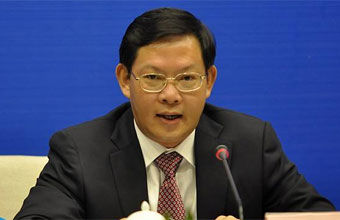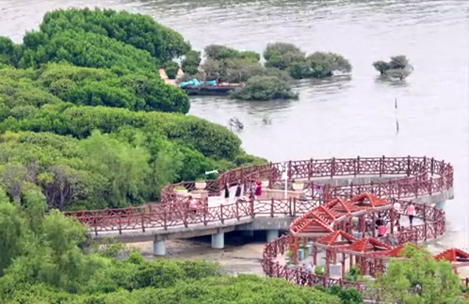Home> Biz Updates
Steel firm to protect habitat
"What I care the most about is the seafood. Can I still have clean and safe shrimp, fish, crabs and seashells after the heavy-industry plant moves in?"
That question came from Huang Xingmin, a 37-year-old resident of Zhanjiang, Guangdong province, when he was asked how much he knew about the steel-and-iron plant project that will be completed in a couple of years where he lives.
Huang said he has heard a lot about the iron-steel complex being built by Baosteel Group, a state-owned conglomerate.
The first phase of the project will be completed in September 2015, and the second phase in the following September. The plant's annual output will be 9.2 million tons of iron and 10 million tons of steel to mainly meet increasing demands from manufacturers of automobiles and electric home-appliances in Guangdong province.
Huang is not alone in being concerned about the project's environmental impact. The 13,200-square-kilometer coastal city of 80 million residents has boasted the best air quality in the region. On weekends, families and their pets stroll beaches and parks, or take a nap amid coconut trees.
For Liu Xiaohua, secretary of the CPC Zhanjiang Municipal Committee, ensuring economic development and maintaining a clean environment are on his list of tasks.
Baosteel's iron-and-steel project may contribute a large portion to the city's GDP growth, according to the steelmaker. While the environment needs to be protected, if the plant's construction and eventual operation are not handled properly, the impact on the livelihood of all the residents could lead to complaints. The tropical city's population recorded an average GDP per capita of less than $5,000 in 2013, lower than many coastal cities in China.
"The economic aggregate of Zhanjiang needs to expand... and Baosteel's project will be one of the biggest contributors to the city's economic development, thus we will make every effort to provide the best services to the steelmaker and the project," Liu said. And it is also must protect the blue seas and the green forests, he added.
Sheng Genghong, general manager of Baosteel Group's Zhanjiang project, said he can assure that the iron-and-steel production will not pollute the city's water and air.
His confidence stems from the project's spending of 6.26 billion yuan ($1 billion) on environmental protection and energy-saving programs at the plant.
"Take water purification for example, each drop of waste water will be purified in steps including flowing through an artificial wetland within the plant. About 99 percent of the water in the plant is recycled and re-used," Sheng said.
The project may become profitable in the third year after production starts, according to Sheng.
In China, over-capacity has troubled the steelmaking industry for years, and Baosteel Group has been determined to shed outdated production methods and aspires to become an environment-and-community-friendly steelmaker, says He Wenbo, general manager of Baosteel Group Corp.
"Baosteel has been working closely with the city and its departments to ensure green development... and the works should be exposed to the public, assuring residents and producers alike," said Hu Yu, deputy director of the news center of the state-owned Assets Supervision and Administration Commission of the State Council.
Hu said state-owned enterprises need to change their image from being only industrial giants, which is distant from people's lives.
"I hope that enterprises' efforts are known to the public, and enterprises themselves will strive further to reciprocate to the public further," said Hu.

 Print
Print Mail
Mail 5G construction supports Zhanjiang's high-quality development
5G construction supports Zhanjiang's high-quality development
 Acting mayor inspects project construction in Xuwen, Leizhou
Acting mayor inspects project construction in Xuwen, Leizhou Zhanjiang island an "egret paradise"
Zhanjiang island an "egret paradise"  Dancing egrets add vitality to Xiashan
Dancing egrets add vitality to Xiashan